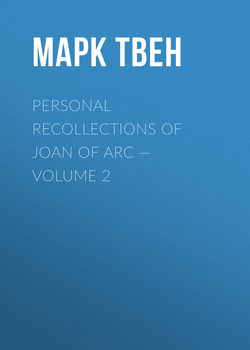Читать книгу Personal Recollections of Joan of Arc — Volume 2 - Марк Твен, ReadOn Classics, Charles Dudley Warner - Страница 10
BOOK II — IN COURT AND CAMP (Continued) 37 Again to Arms
ОглавлениеNOW THESE were nobles, you know, by decree of the King! — these precious old infants. But they did not realize it; they could not be called conscious of it; it was an abstraction, a phantom; to them it had no substance; their minds could not take hold of it. No, they did not bother about their nobility; they lived in their horses. The horses were solid; they were visible facts, and would make a mighty stir in Domremy. Presently something was said about the Coronation, and old D’Arc said it was going to be a grand thing to be able to say, when they got home, that they were present in the very town itself when it happened. Joan looked troubled, and said:
“Ah, that reminds me. You were here and you didn’t send me word. In the town, indeed! Why, you could have sat with the other nobles, and been welcome; and could have looked upon the crowning itself, and carried that home to tell. Ah, why did you use me so, and send me no word?”
The old father was embarrassed, now, quite visibly embarrassed, and had the air of one who does not quite know what to say. But Joan was looking up in his face, her hands upon his shoulders — waiting. He had to speak; so presently he drew her to his breast, which was heaving with emotion; and he said, getting out his words with difficulty:
“There, hide your face, child, and let your old father humble himself and make his confession. I — I — don’t you see, don’t you understand? — I could not know that these grandeurs would not turn your young head — it would be only natural. I might shame you before these great per — ”
“Father!”
“And then I was afraid, as remembering that cruel thing I said once in my sinful anger. Oh, appointed of God to be a soldier, and the greatest in the land! and in my ignorant anger I said I would drown you with my own hands if you unsexed yourself and brought shame to your name and family. Ah, how could I ever have said it, and you so good and dear and innocent! I was afraid; for I was guilty. You understand it now, my child, and you forgive?”
Do you see? Even that poor groping old land-crab, with his skull full of pulp, had pride. Isn’t it wonderful? And more — he had conscience; he had a sense of right and wrong, such as it was; he was able to find remorse. It looks impossible, it looks incredible, but it is not. I believe that some day it will be found out that peasants are people. Yes, beings in a great many respects like ourselves. And I believe that some day they will find this out, too — and then! Well, then I think they will rise up and demand to be regarded as part of the race, and that by consequence there will be trouble. Whenever one sees in a book or in a king’s proclamation those words “the nation,” they bring before us the upper classes; only those; we know no other “nation”; for us and the kings no other “nation” exists. But from the day that I saw old D’Arc the peasant acting and feeling just as I should have acted and felt myself, I have carried the conviction in my heart that our peasants are not merely animals, beasts of burden put here by the good God to produce food and comfort for the “nation,” but something more and better. You look incredulous. Well, that is your training; it is the training of everybody; but as for me, I thank that incident for giving me a better light, and I have never forgotten it.
